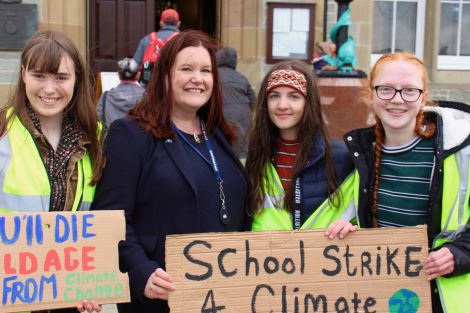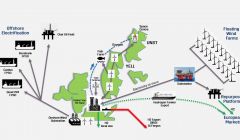Climate / 2019 – ‘the year we realised climate change is real’
DESPITE decades of climate talks, emissions of carbon dioxide and other greenhouse gases continue to rise. Most countries, including the UK, have announced ambitious targets of becoming a net-zero society by 2050. Scotland endeavours to reach the target five years earlier.
So far, there is little evidence how such a radical transformation of society can actually be achieved. To reach net-zero by 2050, climate experts agree that our carbon emissions need to be halved by 2030; that’s just ten years away. The chart below illustrates the size of the challenge ahead.
However, despite the gloom there is no doubt that there is now a greater awareness that climate change is happening, and a growing willingness to accept that change is inevitable and that sacrifices will have to be made. And according to the outgoing governor of the Bank of England, Mark Carney, financial institutions are not cutting investment in fossil fuels quickly enough, and could end up with worthless assets as the sector moves to a zero carbon economy.
At the end of 2018, Shetland News asked local people (or those with a strong link to the local community) what they were doing to in their private and professional lives to counter climate change. Their responses ranged from using more LED lighting and cutting single use plastic to reducing the Shetland Gas Plant’s carbon emissions.
What folk are doing to beat the big New Year climate change challenge
Just before Christmas we asked again to find out if they had managed to stick to their plans and – with the climate emergency a more pressing issue now – what their climate commitments are for 2020.
Here is what they had to say:
In 2019 Shetland Amenity Trust chief executive Mat Roberts made a lot of small changes in his shopping habits, buying local products and removing single plastic use wherever possible.
Become a member of Shetland News
“2019 is the year that we all realised that no matter where we live climate change is real and is already changing the way we live.
“I have a lot more changes to make in the new year, I am looking to switch to an all-electric car and I’m lucky enough to be building a new house with my wife and kids. Our goal is to get as close to zero as possible with energy consumption. This should reduce the carbon we create and the size of our bills.
“At the Shetland Amenity Trust we have a new strategic plan that will see us focus on how the services we offer can help our islands tackle environmental change and our declining nature.
“Looking forward into the decade we face some big decisions. The most thought provoking sentence I have read this year is ‘the single biggest existential threat we face is short-term thinking’.
“Now is the moment for us all to come together and work out what we need to do to make sure Shetland 2050 is a sustainable, inclusive, fair, prosperous and viable community.”
Shetland Islands Council has been criticised for being slow in responding to the climate challenge, and many would like the SIC to declare a climate emergency as more than 1,200 local authorities across the world did in 2019. SIC chief executive Maggie Sandison says living without a car is not easy and, yes, the council is seeking to implement a climate change programme.
“It is really hard to have no car when the weather is bad but I have been persevering with it – I know it’s better for me and better for the environment!
“Not having a car means I have to be better at planning meals and using up whatever is in the fridge so I’ve improved my food waste too but still want to do better in 2020.
“The food growing strategy will be presented to council soon promoting better use of land around council buildings. We will also be seeking approval of a Climate Change Programme incorporating the council’s carbon management action plan.”
Managing director of Loganair, Jonathan Hinkles, insist that flying to and from Shetland is better for the environment than taking the ferry. The airline’s new ATR planes, which are being introduced to the service from this winter, will cut passengers’ carbon footprint even further.
“As a company, we committed last year to replacing our diesel-fuelled ground equipment with electrically powered alternatives and I’m pleased that these have now been implemented in Sumburgh, Kirkwall and Stornoway with our other locations to follow.
“The new ATR aircraft we’re introducing on the majority of services to Shetland in early 2020 have carbon emissions which are around 30 per cent per passenger lower than the Saab 340 and 45 per cent lower than the Saab 2000 aircraft that they are replacing.
“Flying is already the method of transport to and from Shetland which has by far the least impact on the environment – emissions per passenger by ferry are up to nine times higher than a Loganair flight.
“In the rush to condemn aviation’s environmental effects, many folk seem to forget the emissions from the maritime industry are far higher; we need to address both.
“There’s been a lot happening at work, and I’m proud of the steps that we’re taking. At home, we’re still doing all that I mentioned last year – recycling everything we can, sustainable gardening and low energy use to name but three.”
Gardner Rosa Steppanova says sticking to her own targets for 2019 wasn’t easy and hopes to do better in 2020. Her main climate message is that we should consume less, conserve more … and plant trees.
“2019 didn’t turn out quite as green as planned with a lot of unavoidable car usage and three equally unavoidable flights. Must do better in 2020.
“The garden is still a major player in our efforts to reduce our carbon footprint. It provides us with enough timber to feed two solid fuel stoves over the winter. It is a totally sustainable, as no trees are killed in the process. Our firewood comes from coppicing willows and/or reducing the crowns of large trees to prevent windfall. It not only reduces our use of fossil fuel, it’s also a massive financial saving and provides a lot of healthy exercise.
“The most important event of 2019 was our attending the climate change protest in September. We did so with Stop Viking Energy – Save our Peat Bogs placards and trepidation in our hearts. We needn’t have worried.
“Apart from a handful of wind fundamentalists, most of those gathered had got the message that putting turbines on peat is the same as burning or cutting down rain forest to plant biofuel crops.
“The most effective way of mitigating climate change is not producing more and more and more “green energy” but about preserving valuable carbon sinks, planting trees and conserving energy.”
In June last year more than 100 local school children took to the streets of Lerwick to demand action as part of the global climate strike movement. Anderson High School students Isla Johnston, Laura Bisset and Celestine Verdcourt-Laurenson explain their plans for 2020.
“In 2020 more global action on environmental issues is demanded; we as a community need to come together and tackle the issues we have here on our islands.
“We, Eco Youth Shetland, are planning to push for more eco friendly alternatives in schools around Shetland. One of the main concerns of school children in Shetland is the excessive single use plastic packaging used in the canteens.
“We will also continue on informing young people about climate change and how it affects our wildlife, our day-to-day lives and most importantly our planet, and how they can reduce their carbon footprint by the choices they can make.”
Journalism student at Edinburgh Napier University, Iona Nicol, says aggressive environmentalism tends to be counter-productive.
“I have generally stuck to my pledges from last year. When purchasing goods such as fruit and vegetables, I tend to go for items that are ‘naked’ with no packaging.
“Living in Edinburgh has also encouraged me to walk more and use public transport more often as well.
“However, at university I was randomly accosted by two students for using a plastic fork that was provided with my meal. This sort of behaviour discourages me from wanting to actively take part in pushing sustainability.
“It’s worth keeping in mind that everyone should do their bit to be environment friendly during the climate crisis. However, being aggressive and condescending when pushing your views, tends to put people off of the idea.”
What are your thoughts on the climate crisis? While there are still people out there who are denying our use of fossil fuels are the cause of climate change, even the oil industry is making strenuous efforts to cut its carbon footprint
Please feel free to respond by either leaving a comment at the bottom of this page, message us via our Facebook page or e-mail us at news@shetnews.co.uk
Become a member of Shetland News
Shetland News is asking its many readers to consider paying for membership to get additional features and services: -
- Remove non-local ads;
- Bookmark posts to read later;
- Exclusive curated weekly newsletter;
- Hide membership messages;
- Comments open for discussion.
If you appreciate what we do and feel strongly about impartial local journalism, then please become a member of Shetland News by either making a single payment, or setting up a monthly, quarterly or yearly subscription.























































































